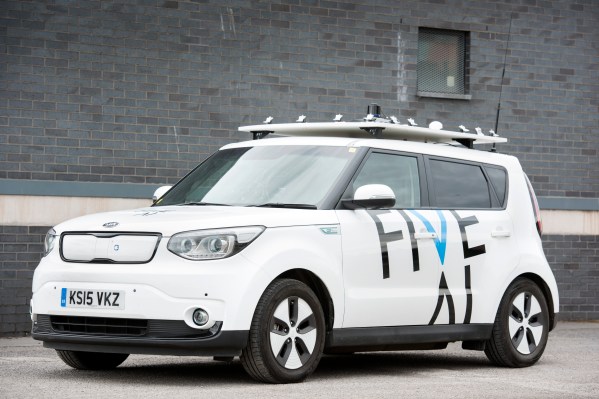The race is on for autonomous vehicle technology, and now a startup out of the U.K. is the latest to throw its hat into the ring to help build it. Cambridge-based FiveAI — a partner in the U.K.’s StreetWise self-driving project — has raised £14 million ($18 million) and £12.8 million ($17 million) in two tranches to fill out its plans for a two-part business in the world of self-driving services. First, FiveAI is building its own autonomous driving system; and second, FiveAI will use that AI-based platform to take on Uber and other transportation services with a fleet of self-driving taxis.
Lakestar Capital — the firm founded by prolific (and successful) investor Klaus Hommels — led this Series A round, with Amadeus Capital Partners, Notion Capital and Kindred (which all previously invested in its seed round of $2.7 million) also participating.
On top of the Series A, FiveAI will also get a boost in the form of a grant from the U.K. government: it has so far received £12.8 million ($17 million) for StreetWise, a project it’s working on with Transport for London, the Transport Research Laboratory, Oxford University, insurer Direct Line and others to develop a self-driving car pilot for London to cut traffic congestion and free up parking spaces. StreetWise is slated for its first test runs at the end of 2019.
There are many, many companies today working on autonomous car systems. They include other startups like Zoox and Nutonomy (which, like FiveAI, are building platforms that they plan to use in their own fleets), transportation providers like Uber, car makers (which themselves are acquiring startup talent to kickstart their efforts), those like Bosch that build in-car systems already and, of course, tech giants like Google, Apple and Baidu that approach cars like the next big hardware challenge.
With the billions in funding and armies of engineers that these companies have to commit to these efforts, FiveAI’s Series A and government grant appear very modest indeed.
But Stan Boland — FiveAI’s CEO and co-founder — is not one to be deterred. In an interview earlier today in FiveAI’s (still sparse) new offices, he made a case for why Europe needs its own startup in this area. For one, our driving culture is completely different and our cities don’t look like cities in the U.S. or Asia. And further, he argues that it’s high time that we see more moonshots coming from here, building on the region’s strength in artificial intelligence.
“We think it’s time that Europe builds a big tech company,” he said, noting that transport could well be at the heart of that big tech company. “Transport is a sector that is ready for change.”
It so happens that Boland is probably one founder investors will listen to when he explains a big plan. He has been at the head of some of Europe’s biggest startup exits in the last several years: they include Element 14, a spin-out from ARM that was acquired by Broadcom for $640 million; Icera, acquired by Nvidia for $367 million; and IoT startup Neul, acquired by Huawei, before moving on to FiveAI with other co-founders Ben Peters, Steve Allpress, John Redford and Simon Walker.
“If anything, the bolder you are with investors, the more they seem to want to give you,” he said. (This may be a consequence of the aforementioned track record. I’m fairly certain that if, say, I walked into Klaus Hommels’ office and described my vision for an autonomous car startup, I might get quietly escorted out of the room.)
“FiveAI is a fantastic example where the U.K. has the talent, ambition and market to build a truly successful technology-led company. Dense European cities present totally different technical, behavioral, regulatory and infrastructure challenges to their U.S. and Chinese counterparts for safe urban driverless technologies,” said Lakestar Capital’s Dharmash Mistry, who is joining FiveAI’s board with this round. “By assembling its talented team in the U.K. and seeking to support London’s transport objectives in partnership with the city itself, FiveAI can play a vital role in reducing congestion, emissions, costs, accidents and journey times, boosting the city economy at the same time.”
To be clear, he also added that FiveAI has raised exactly as much as it wanted to, for now, and he also said that he has also put some of his own money into the operation, as well.
To date, FiveAI has yet to launch any products, and if you have been following the autonomous car space you know there are many pieces that will need to come together before FiveAI, or any other company, can hope for large deployments.
Boland describes FiveAI today as in “Phase One” of its business plan: it is building an autonomous platform to run vehicles, which will include demonstrating the platform’s cognitive abilities and running pilots. Phase Two will include the development of a dispatch system, the user experience development and the first commercial launch. It will also involve much more work to improve the regulatory environment “to make it feasible.” He believes this will come in 2021.
Phase Three will be FiveAI’s big push to scale in the market. “It’s at that point that we will need to buy lots of cars,” where FiveAI’s autonomous system will be loaded, he said. “It’s probably at that point that we’ll need to raise a significant amount of money, in the hundreds of millions or billions.”
As for a Plan B, there is no Plan B that Boland will consider today.
“We do recognize that startups do pivot, but we are not running multiple contingency plans right now,” he said.
“It may sound completely mad to some,” he said, “but the reason why we think it’s needed and will work is because personal mobility is not going to be a winner takes all market. There is no single solution that will work everywhere. We can change public transport.”
FiveAI is not revealing its valuation with this round.
